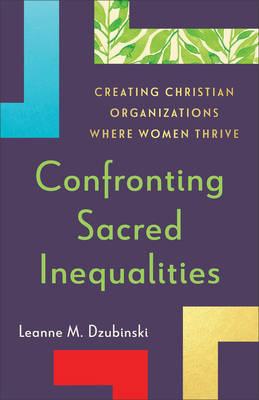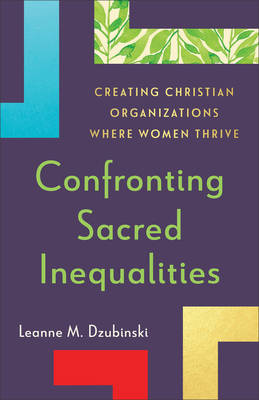
Bedankt voor het vertrouwen het afgelopen jaar! Om jou te bedanken bieden we GRATIS verzending (in België) aan op alles gedurende de hele maand januari.
- Afhalen na 1 uur in een winkel met voorraad
- In januari gratis thuislevering in België
- Ruim aanbod met 7 miljoen producten
Bedankt voor het vertrouwen het afgelopen jaar! Om jou te bedanken bieden we GRATIS verzending (in België) aan op alles gedurende de hele maand januari.
- Afhalen na 1 uur in een winkel met voorraad
- In januari gratis thuislevering in België
- Ruim aanbod met 7 miljoen producten
Zoeken
Confronting Sacred Inequalities
Creating Christian Organizations Where Women Thrive
Leanne M Dzubinski
Paperback | Engels
€ 31,95
+ 63 punten
Omschrijving
Why do women often struggle to thrive in Christian workplaces?
Prominent male Christian leaders are often called to account for improper behavior with women in their organizations. There are certainly a few bad actors, but is something systemically amiss in Christian organizations?
In Confronting Sacred Inequalities, Leanne Dzubinski shows how secular inequalities have been imported into Christian spaces and treated as sacred. Beliefs about women that don't align with Scripture and God's view of women have too often been promoted as biblical. She identifies five pitfalls that often occur in Christian organizations that make it difficult for women to flourish:
● "Sex and the office" An undue focus on sexuality
● "Hey, guys!" Language that marginalizes women
● "I can't; I have to work" Assumptions about work culture that leave women feeling like they constantly fall short
● "Are you sure that's right?" Ambivalence toward women
● "There are no good women leaders" Cultural and Christian stereotypes that frame leadership as male
Dzubinski explains how organizational dysfunction is often caused by systems that prioritize men over women in ways that are detrimental to the organization as well as to the people in them--men and women alike. Each chapter offers scriptural perspectives and practical suggestions to help leaders create organizational cultures where everyone can flourish and work together as siblings in Christ.
Prominent male Christian leaders are often called to account for improper behavior with women in their organizations. There are certainly a few bad actors, but is something systemically amiss in Christian organizations?
In Confronting Sacred Inequalities, Leanne Dzubinski shows how secular inequalities have been imported into Christian spaces and treated as sacred. Beliefs about women that don't align with Scripture and God's view of women have too often been promoted as biblical. She identifies five pitfalls that often occur in Christian organizations that make it difficult for women to flourish:
● "Sex and the office" An undue focus on sexuality
● "Hey, guys!" Language that marginalizes women
● "I can't; I have to work" Assumptions about work culture that leave women feeling like they constantly fall short
● "Are you sure that's right?" Ambivalence toward women
● "There are no good women leaders" Cultural and Christian stereotypes that frame leadership as male
Dzubinski explains how organizational dysfunction is often caused by systems that prioritize men over women in ways that are detrimental to the organization as well as to the people in them--men and women alike. Each chapter offers scriptural perspectives and practical suggestions to help leaders create organizational cultures where everyone can flourish and work together as siblings in Christ.
Specificaties
Betrokkenen
- Auteur(s):
- Uitgeverij:
Inhoud
- Aantal bladzijden:
- 184
- Taal:
- Engels
Eigenschappen
- Productcode (EAN):
- 9781540967589
- Verschijningsdatum:
- 24/02/2026
- Uitvoering:
- Paperback
- Formaat:
- Trade paperback (VS)
- Afmetingen:
- 140 mm x 216 mm

Alleen bij Standaard Boekhandel
+ 63 punten op je klantenkaart van Standaard Boekhandel
Beoordelingen
We publiceren alleen reviews die voldoen aan de voorwaarden voor reviews. Bekijk onze voorwaarden voor reviews.









